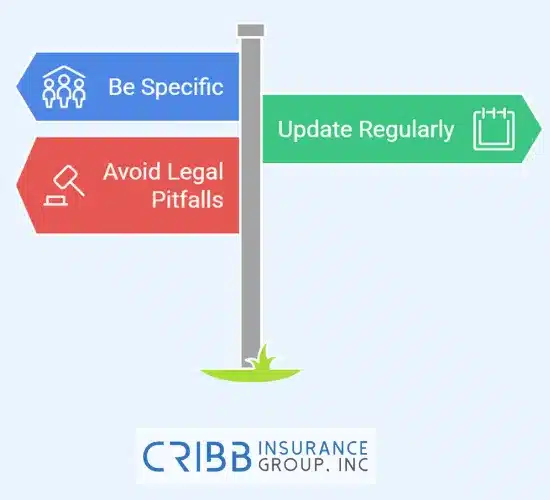Deciding your life insurance beneficiary is a deeply personal decision that ensures financial security for your loved ones. By understanding key life insurance beneficiary rules, you can safeguard your family’s future and ensure your policy reflects your intentions. Whether you’re naming a beneficiary for the first time or updating an existing designation, getting the details right provides peace of mind and long-term protection for those who matter most.
What Is a Beneficiary?
A beneficiary is the person, entity, or organization you designate to receive the payout from your life insurance policy. Think of it as a promise to safeguard your loved ones or support causes you care about after you’re gone. There are two main types of beneficiaries:
- Primary Beneficiary: The first to receive the policy’s death benefit.
- Contingent Beneficiary: Acts as a backup, stepping in if the primary beneficiary cannot or chooses not to claim the benefit.
Having both types provides a clear roadmap for your policy’s distribution, avoiding unnecessary delays or disputes.
The Importance of Clarity in Beneficiary Designations
Clearly defining your beneficiaries is essential for ensuring your wishes are followed. Vague or incomplete designations can lead to complications, including disputes or legal delays. According to a recent survey reported by Forbes, 52% of Americans haven’t updated their life insurance beneficiaries after major life events, leaving their loved ones at risk of unintended consequences.
Steps to Ensure Clarity
- Be Specific: Include full names, relationships, and, where required, identifying information like Social Security numbers. Avoid general terms like “my children” without further clarification.
- Update Regularly: Life events such as marriage, divorce, or having children should prompt a review of your beneficiary designations.
- Avoid Legal Pitfalls: Some states have specific laws regarding beneficiary spousal consent in community property states. Understanding these rules can prevent conflicts.

Primary vs. Contingent Beneficiary: What’s the Difference?
Your primary beneficiary is the first to receive the death benefit from your life insurance policy. The contingent beneficiary serves as a backup if the primary cannot claim the payout. Both ensure your policy benefits are distributed smoothly, even in unexpected circumstances.
Why It Matters
Without a contingent beneficiary, the payout could default to your estate, potentially causing legal delays and tax implications. Here are a couple of examples to illustrate:
- Primary Beneficiary Predeceases You: Imagine your spouse is your primary beneficiary, but they pass away before you. By naming your child as the contingent beneficiary, the payout would go directly to them, bypassing probate and avoiding unnecessary delays.
- Outdated Beneficiary Designation: In a case reported by the Wall Street Journal, a man’s ex-spouse received nearly $750,000 from his retirement account because he failed to update his beneficiary form after their divorce. This mistake highlights the potential financial and emotional consequences of not revisiting your designations.
Pros and Cons Table: Primary vs. Contingent Beneficiaries
| Aspect | Primary Beneficiary | Contingent Beneficiary |
|---|---|---|
| Definition | First to receive the death benefit. | Backup if the primary cannot claim the benefit. |
| Pro | Ensures the benefit is distributed directly and without delay. | Prevents the payout from defaulting to the estate. |
| Con | If the primary predeceases the policyholder, there may be delays. | Only activated if the primary cannot claim. |
| Example Scenario | Spouse receives the payout immediately after the policyholder’s death. | Child steps in if the spouse predeceases the policyholder. |
Legal Documents Needed to Designate a Beneficiary
Having the right documents in place ensures your life insurance beneficiary designations are legally valid and easy to process. Here’s what you might need:
- Proof of Identity: Documents like a driver’s license or passport for you and the named beneficiary.
- Guardianship or Trust Papers: These are needed if you’re naming a minor as a beneficiary. They ensure the payout is managed responsibly until the child is old enough to receive it directly.
- Policy Forms: These forms, provided by your insurer, allow you to name or update your beneficiaries.

Organizing these documents ensures your designations are legally valid and processed without unnecessary delays.
Common Mistakes to Avoid When Naming Beneficiaries
Errors in beneficiary designations can lead to unintended consequences. Here are the most common pitfalls and how to avoid them:
- Failing to Update Beneficiaries: Major life changes like marriage, divorce, or having children often require adjustments to your designations.
- Not Designating a Contingent Beneficiary: If your primary beneficiary cannot accept the payout, a lack of a contingent beneficiary could delay the process or cause the benefit to go to your estate.
- Relying Solely on a Will: A life insurance policy operates separately from a will. Ensure your designations are updated directly with your insurance provider.
Special Situations: Who Can Be a Beneficiary?
The flexibility of beneficiary designations allows you to tailor your policy to your unique circumstances. Options include:
- Individuals: Commonly, spouses, children, or close relatives are named as beneficiaries to provide financial support directly to loved ones.
- Charitable Organizations: If you wish to support a cause, include the charity’s legal name and tax ID to avoid delays in fund allocation.
- Trusts: Trusts are an option for nuanced financial needs, such as safeguarding assets or ensuring long-term support for dependents. They can be particularly useful when minor children or individuals with special needs are involved.
Life Events That Trigger Beneficiary Updates
Life is full of changes, and your life insurance beneficiary rules should reflect those changes. Significant events to consider include:
- Marriage or Divorce: Update your designation to align with current relationships.
- Birth or Adoption of a Child: Ensure new dependents are covered.
- Death of a Beneficiary: If a named beneficiary passes away, revise your policy to include someone else.
Can a Will Override a Life Insurance Beneficiary?
No, a will cannot override your life insurance beneficiary designation. This ensures the death benefit goes directly to the person or entity you named in your policy. For this reason, it’s essential to regularly review your beneficiary designations to reflect your current intentions, as they take precedence over a will in distributing life insurance proceeds.

How Beneficiaries Claim Life Insurance Benefits
Claiming life insurance benefits is straightforward if all documentation is in order. Beneficiaries will typically need:
- A Copy of the Death Certificate: This is essential for initiating the claim.
- Identification: Proof of identity to verify the beneficiary.
- Policy Claim Form: Provided by the insurance company to complete the request.
Having these documents prepared ensures a smooth and efficient claims process.
The Role of Trusts in Beneficiary Designation
If you’re considering adding a trust as your life insurance beneficiary, it’s a smart move for managing complex estates. Before deciding if this option suits your needs, it’s helpful to consider both the benefits and potential challenges. The guide below outlines these key aspects for a clearer understanding.
| Aspect | Pros | Cons |
|---|---|---|
| Control | Provides detailed instructions for how and when funds should be distributed. | Trust setup requires legal assistance, which can be costly. |
| Flexibility | Tailored support for minors, special needs dependents, or multiple beneficiaries. | Lack of direct access to funds for beneficiaries without trustee approval. |
| Avoid Probate | Prevents payout delays by bypassing probate court. | Mismanagement by an inexperienced trustee can lead to unintended consequences. |
Secure Your Loved Ones with Smart Beneficiary Choices
Applying life insurance beneficiary rules ensures your loved ones receive the financial support they deserve without unnecessary complications. At Cribb Insurance Group Inc in Bentonville, AR, we specialize in guiding you through these decisions. Whether you’re naming your first beneficiary or reevaluating your designations, we’re here to provide expert support every step of the way.

Frequently Asked Questions
What information is needed to identify a beneficiary?
You’ll need their full legal name, date of birth, and relationship to you, as well as, sometimes, a Social Security or tax identification number.
How can a life insurance policy benefit non-citizen beneficiaries?
Non-citizens can receive benefits but may need additional documentation like a passport or tax ID to claim the payout. Consulting a financial advisor can help address tax implications.
Can I name multiple beneficiaries for my policy?
Yes, you can name more than one beneficiary and assign a specific benefit percentage to each—for example, 70% to a spouse and 30% to a child.
What happens if I name a minor as a beneficiary?
Life insurance payouts cannot go directly to minors. Setting up a trust or naming a guardian ensures the funds are managed until the minor comes of age.
Can a beneficiary refuse the payout?
Yes, a beneficiary can decline the benefit, which would go to the contingent beneficiary or your estate.
Plan Your Policy with Confidence
Take the next step in securing your family’s financial future. Contact Cribb Insurance Group Inc in Bentonville, AR, for expert guidance on life insurance policies and beneficiary designations. Let’s make your insurance journey simple, personal, and impactful. Call us today to get started!





